Table of Contents
Are you looking for the best probiotic foods for kids to eat to give your child the best chance for a healthy and happy gut?
This article is packed with information on probiotic foods that kids will love to eat. From yoghurt to kimchi, I’ve got you covered with options for kids of all ages.
Whether you’re looking to resolve tummy troubles or just improve your kid’s gut health, you’re sure to find some delicious and effective probiotic options.
Maybe you are hoping that probiotic foods can help resolve their tummy troubles so they eat, poop and sleep better.
If so, get ready to dive into a world of healthy and happy tummies with probiotic foods for kids!
What are probiotics?
Probiotics are live bacteria and yeasts that live in our bodies.
Both adults and children have a community of live beneficial bacteria living throughout the body.
These friendly bacteria are found in our gut, skin, nose, mouth, throat and vagina.
However, did you know that the majority of these beneficial bacteria are found in the gut? Here they serve as tiny helpers that help maintain balance in the body.
Your child will therefore benefit from including a range of probiotic foods for kids.
These typically include fermented foods like yoghurt.
But if your child doesn’t like any of the foods listed below, then you can give them probiotic supplements.
Generally, probiotic supplements come in various forms like powders, tablets, gummies and capsules.
Learn more about the best sources of probiotic supplements in 12 Best Probiotics For Kids.
What are the benefits of probiotic foods for kids?
Probiotics play an important role in gut health aiding digestion, increasing the absorption of minerals like calcium, supporting the immune system and potentially even improving mood.
They can also help improve symptoms of constipation or IBS-diarrhoea.
Some studies have shown that certain types of probiotics can help with symptoms of irritable bowel syndrome and reduce the severity of diarrhoea in children and adults.
Including probiotic foods for children can help achieve the health benefits that probiotics are thought to offer.
What you need to know about probiotics for kids
If you are a parent looking to improve your child’s digestive health and general immunity, you may be wondering about the benefits of probiotics for kids.
Probiotics are live microorganisms that are similar to the good bacteria found in our gut.
They can be consumed in the form of fermented foods like yoghurt or kefir, or if your child does not enjoy these, you can give them a probiotic supplement.
Giving your child some of the best probiotic foods for kids like yoghurt, kimchi, sauerkraut, miso and tempeh can help improve their overall gut health, support their immune system and overall wellness.
But if your child has a medical condition and is immunocompromised then please do not start a probiotic supplement without discussing it with your child’s paediatrician.
Having said that, for most healthy children, the right probiotic strains and probiotic foods can support a happy and healthy gut.
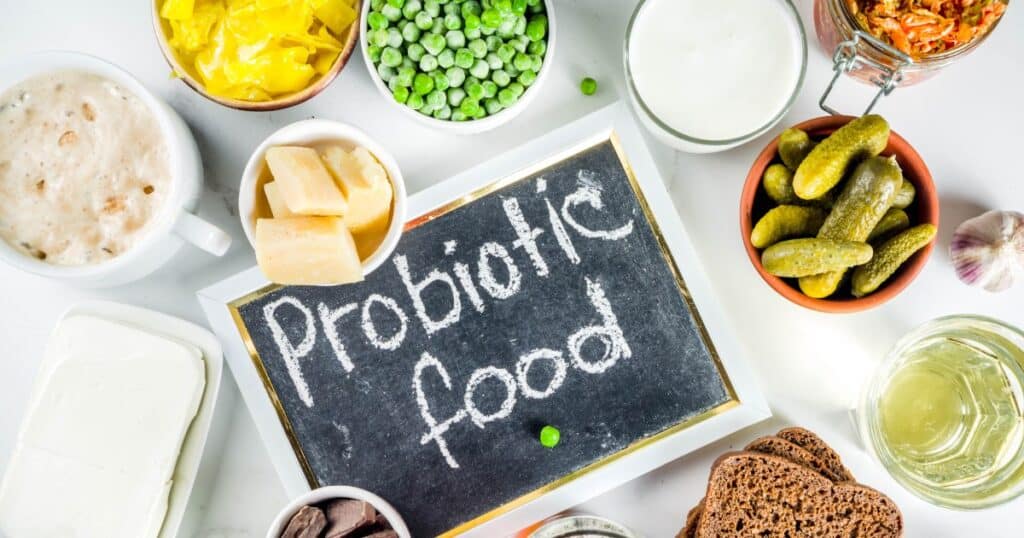
Probiotic foods for kids
What foods are probiotic foods for kids? See the list below:
- Cheese: some types of aged cheese are a source of probiotics. The cheese will be aged but has not been heated afterwards (unpasteurised). Examples include soft and hard cheeses like Swiss, Gouda, cheddar, Edam, Gruyere, feta, Emmental, Parmesan and some types of cottage cheeses (check the labels for the presence of live and active cultures that have been added).
- Yoghurt: choose plain or unsweetened varieties where possible. You can naturally sweeten it with honey or maple syrup to control the amount of added sugar. Or why not serve it with chopped fruit? Yoghurt can be a source of probiotics, but make sure to check whether the manufacturer has included live bacteria and whether they’ve done any research to see if the strains do reach the gut alive. You can also use yoghurt with live bacteria in smoothies, dips and other dishes.
- Kefir: this fermented drink is similar to yoghurt and is another source of probiotics. You can spoon it over children’s breakfast cereals and pair it with fruit if they don’t want to drink it on its own. Kefir is also now available in a variety of fruity flavours.
- Miso: This Japanese paste is made from fermented soybeans and is commonly used as a base for soups, sauces and marinades. Why not try marinating fish or enjoy miso soup over the winter for an Asian-inspired meal?
- Kombucha: is slightly fizzy so older children will enjoy these as an alternative to fizzy drinks with added sugar.
Does your child need foods with probiotics?
If you are wondering whether your little ones need probiotic-packed foods in their diet, the answer is not exactly a straightforward one.
Here’s why: If you are looking to ‘boost’ your child’s immunity, incorporating probiotic-rich foods into their diet can definitely help add some friendly bacteria to their gut.
But it’s not the be-all and end-all solution.
Remember, you can’t just suddenly ‘boost’ your child’s immunity.
The best way to support their immune system’s full potential is by encouraging them to eat a diverse range of foods that includes some probiotic foods for kids to eat.
What’s more is that a balanced diet that includes a mix of gut-friendly foods, like prebiotics, is key to keeping their digestive system in tip-top shape.
So while probiotic foods for toddlers and older children can be part of the equation, they’re only one piece of the puzzle.
It’s all about finding the right balance to support your child’s gut health.
Can prebiotic foods help too?
Prebiotics are non-digestive food ingredients that feed the good bacteria in our gut.
They are essential to promote the growth and activity of beneficial bacterial microorganisms for a thriving digestive system.
Common prebiotic foods that you will be familiar with include artichokes, garlic, onions, leeks, asparagus and bananas.
Occasionally you may see ‘health’ foods have something called prebiotic fibres added to foods.
These have been extracted from plants to make the food item more desirable and ‘gut friendly’. Examples of prebiotic fibres include inulin and oligosaccharides.
Manufacturers add prebiotics to their products as prebiotics help the beneficial bacteria in the gut to thrive.
Studies have shown that it can help improve gut health by improving symptoms like constipation in children.
However, more research is required to understand the benefits of foods with added prebiotic fibres.
To improve children’s overall gut health, it’s best to encourage them to eat whole foods that are naturally high in prebiotics.
While prebiotic supplements are available, consuming whole food not only provides prebiotics, but also all of the other essential nutrients and benefits that come with it.
For example, when children eat bananas, it’s a great way for them to get prebiotic fibre in their diets, as well as other important nutrients like slow-releasing carbohydrates, total dietary fibre, potassium and more.
By eating the whole food, your child will receive all of the benefits that the plant has to offer, than just the extracted prebiotic fibre.
This not only supports their gut health but also their overall growth and development.
It can also help meet their requirements for other vitamins and minerals.
As you can see, it’s not just about fermented foods for kids’ gut health.
A balanced diet that includes foods that contain probiotics, as well as prebiotics, is important.
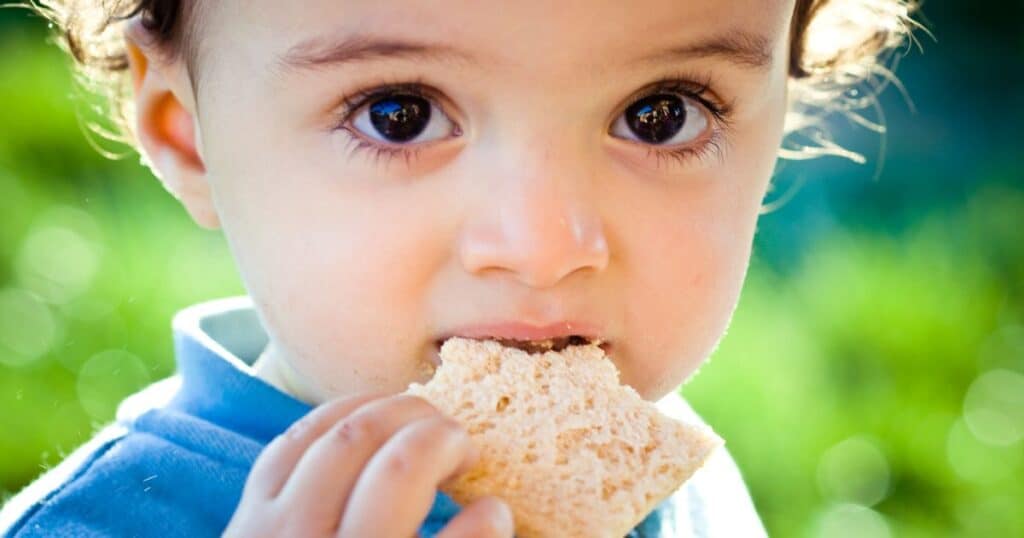
What are prebiotic foods?
Here are examples of prebiotic foods for kids to eat.
- Bread (wholemeal/wholegrain variety)
- Other whole grains
- Bananas
- Garlic
- Onions
- Oats
- Leeks
- Flaxseeds
- Lentils
- Legumes
- Soybeans
- Apples
- Berries
- Kiwifruit
- Peaches
- Plums
- Pears
The levels of prebiotics in these foods will be different.
Every child’s gut microbiome is also different so your child will respond differently to each of these foods compared to another child.
This is why it’s important to encourage a diet that includes probiotic foods as well as prebiotic rich foods.
Are there probiotics in breast milk?
Breastmilk is rich in both probiotics (human milk microbiota) and its own special human milk prebiotics!
In fact, human milk prebiotics is specifically present to encourage the growth of very specific bacterial species in the infant’s gut.
Human milk prebiotics help shape the infant’s gut microbiota and immune development.
You can learn more about how your child’s gut is shaped in my Healthy Poop Essentials Bundle where you’ll also get access to my training video “Understanding Your Child’s Microbiome and Stools.”
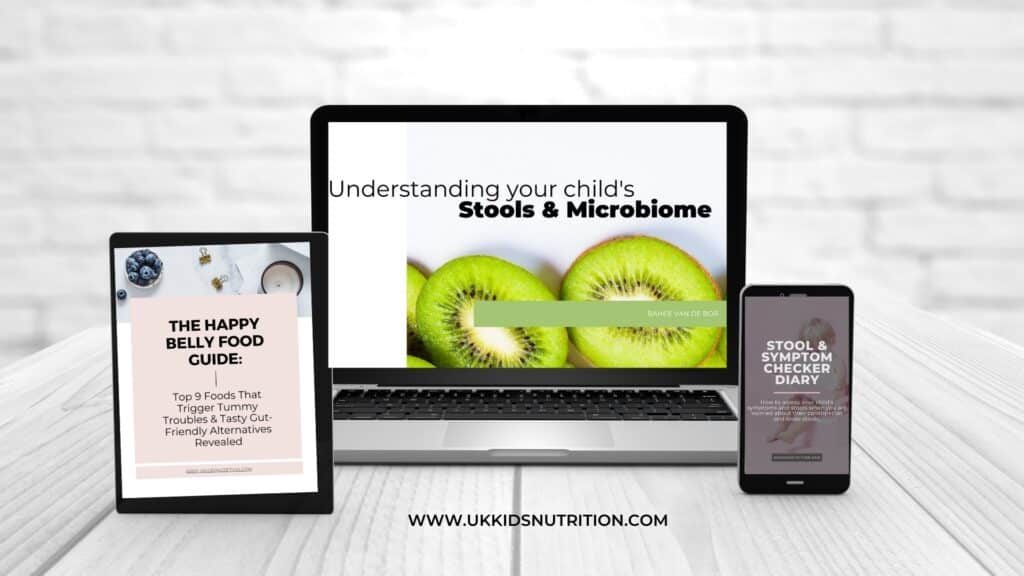
Are there probiotics in infant formula?
Most infant formulas do not contain added probiotics.
At present only two types of specialist infant formula contain added probiotics.
What are the best probiotic foods for picky eaters?
If your child is refusing to try kefir, kombucha and kimchi please try not to worry!
One of the easiest ways to introduce probiotic foods for kids is yoghurt and cheese.
You can pair yoghurt with preferred foods like fruit or get them to dip a food that they do like into the yoghurt to try some tiny tastes.
Many children who refuse to try new foods may be willing to try the cheese.
When it comes to cheese, previous studies have shown that probiotic bacteria survive well in both cheddar and Gouda cheeses.
Also, other types of cheeses have probiotics added after processing so it’s a good idea to read labels to check for active and live cultures.
For 1:1 support with a picky eater, see my Fussy Eating Solutions programme.
Probiotic yoghurt for kids
When it comes to yoghurt, you might see a lot of brands marketed specifically for kids.
But guess what? It’s absolutely fine to buy a ‘regular’ yoghurt for your entire family.
Now some kids’ probiotic yoghurts have one perk that is worth considering.
They often have lower added sugar levels (but be sure to check those labels though!).
But apart from that, a regular yoghurt can work just as well for the entire family.
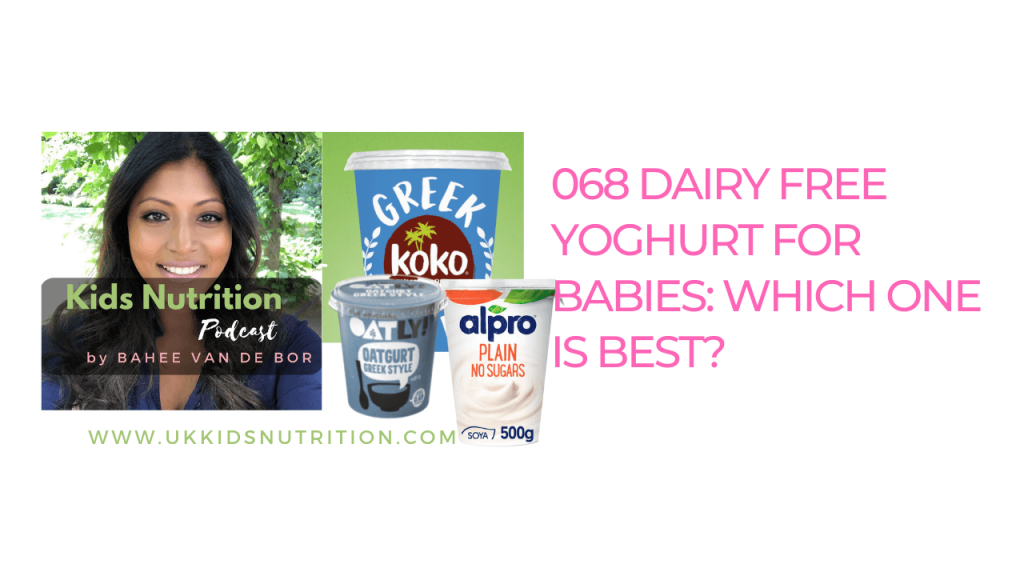
Best probiotic yoghurt for babies and toddlers
If you are on the hunt for a yoghurt brand, I have a personal favourite to recommend – Danone Kids.
Now it’s worth noting that there’s added sugar in their regular yoghurts but considerably less in the kid’s range.
You can also alternate between natural yoghurt and the fruity flavours, or even go for a 50-50 split! The choice is yours!
As you can see, yoghurt can easily be a tasty and natural probiotic food for babies and toddlers.
Good habits for kids that improve overall gut health
In summary, if your little one is open to trying new fermented foods like kimchi, kefir, kombucha and tempeh, that’s fantastic!
But if they are not the biggest fan of these foods – please don’t worry.
A great way to start incorporating probiotic foods for kids is yoghurt and cheese. Just be sure to include a brand that incorporates live bacteria.
Or make sure that the cheese has been aged.
And don’t forget, it’s important to encourage a well-rounded diet that includes a variety of gut-friendly foods, like prebiotic-rich options, to support their gut health and immune system.

Work with me
I have a number of programmes designed to help you and your child. Learn more by clicking the links below.
IBS Kids Mastery Method
Happy Belly Formula Programme
Fussy Eating Solutions
Nail Milk Allergy
Explore the Learning Hub

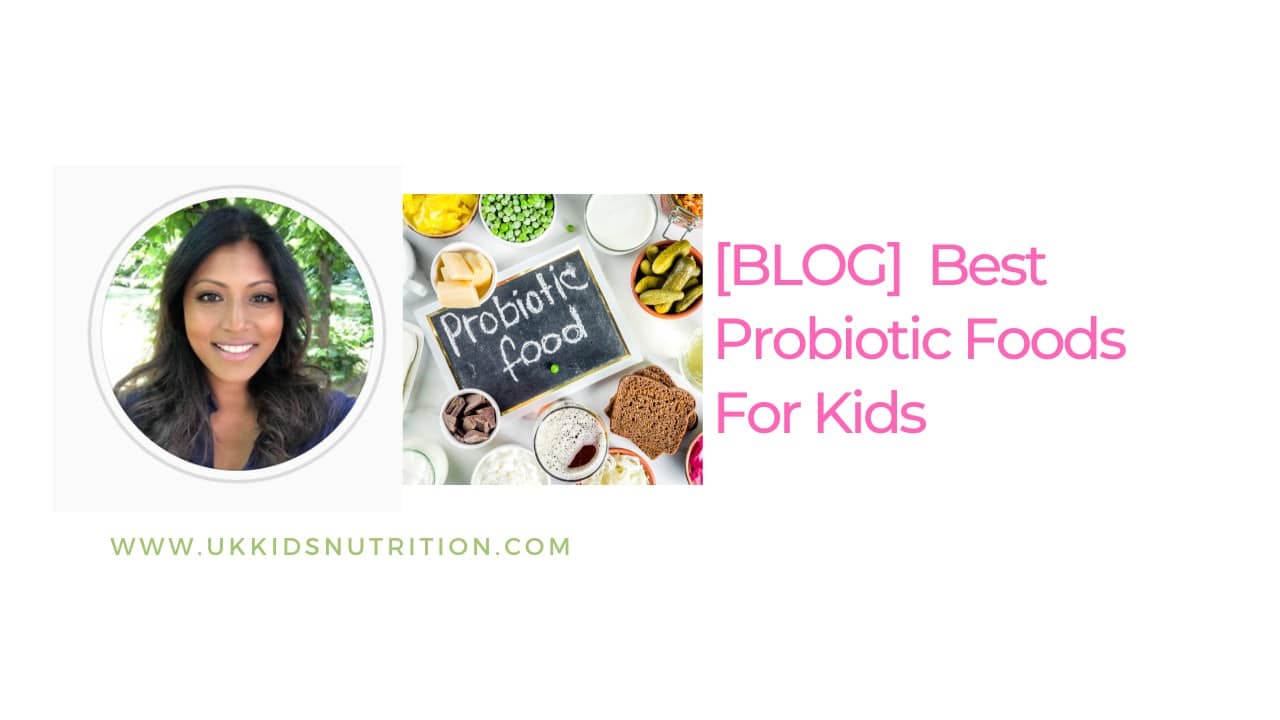
More Stories
The One Thing You Should Never, Ever Do if You Have Insulin Resistance and Want to Lose Weight
Tuna Salad Lunch Box – JSHealth
Advanced Wellness Course – Heart Health